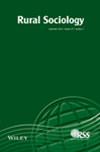“It's On All the Time in Our House:” Police Scanners and Everyday Rural Life*
IF 1.9
3区 社会学
Q2 SOCIOLOGY
引用次数: 0
Abstract
Police radio scanners are a common feature of homes in rural Upstate New York, but little attention has been given to how their use affects local communities. Drawing on in‐depth interviews with residents of a small town in the Adirondack Park, I examine how the scanner becomes a key factor in structuring experiences of daily life. A common feature of rural communities, the scanner positions policing at the center of everyday life, shapes perceptions of criminality and policing for those listening, and may have significant consequences for vulnerable residents. The scanner provides residents with the opportunity to develop informal networks of care, yet simultaneously limits the ability of some residents to access community and emergency services. I argue that the scanner comes to mediate contradictory structures for the town and blends police power and presence with the experience of everyday rural social life as part of broader processes that delineate, justify, and legitimize boundaries of social difference. Bridging scholarship on rural communities and police technology, this project advances a framework to understand how the scanner shapes and structures access to symbolic capital vis‐a‐vis the state and logics of policing in the name of community safety.“我们家时时刻刻都在开着:”警察扫描仪和日常农村生活*
警用无线电扫描仪是纽约北部农村家庭的一个常见特征,但很少有人注意到它们的使用对当地社区的影响。通过对阿迪朗达克公园一个小镇居民的深入访谈,我研究了扫描仪如何成为构建日常生活体验的关键因素。作为农村社区的一个共同特征,这种扫描器将警务置于日常生活的中心,塑造了那些倾听者对犯罪和警务的看法,并可能对弱势居民产生重大影响。扫描仪为居民提供了发展非正式护理网络的机会,但同时也限制了一些居民获得社区和紧急服务的能力。我认为扫描仪调解了城镇的矛盾结构,并将警察的权力和存在与日常农村社会生活的经验融合在一起,作为描绘、证明和合法化社会差异边界的更广泛过程的一部分。该项目将农村社区和警务技术方面的学术研究结合起来,提出了一个框架,以了解扫描仪如何塑造和构建相对于社区安全的状态和警务逻辑的象征性资本。
本文章由计算机程序翻译,如有差异,请以英文原文为准。
求助全文
约1分钟内获得全文
求助全文
来源期刊

RURAL SOCIOLOGY
SOCIOLOGY-
CiteScore
4.60
自引率
13.00%
发文量
47
期刊介绍:
A forum for cutting-edge research, Rural Sociology explores sociological and interdisciplinary approaches to emerging social issues and new approaches to recurring social issues affecting rural people and places. The journal is particularly interested in advancing sociological theory and welcomes the use of a wide range of social science methodologies. Manuscripts that use a sociological perspective to address the effects of local and global systems on rural people and places, rural community revitalization, rural demographic changes, rural poverty, natural resource allocations, the environment, food and agricultural systems, and related topics from all regions of the world are welcome. Rural Sociology also accepts papers that significantly advance the measurement of key sociological concepts or provide well-documented critical analysis of one or more theories as these measures and analyses are related to rural sociology.
 求助内容:
求助内容: 应助结果提醒方式:
应助结果提醒方式:


